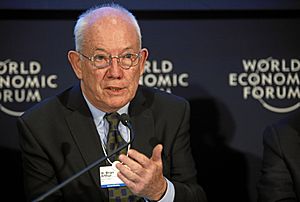W. Brian Arthur facts for kids
Quick facts for kids
William Brian Arthur
|
|
|---|---|

Arthur at the World Economic Forum Annual Meeting, 2011
|
|
| Born | 31 July 1945 |
| Citizenship |
|
| Institutions |
|
| Field | Complexity economics |
| Alma mater | Lancaster University University of Michigan |
| Doctoral advisor |
Stuart Dreyfus |
| Contributions |
|
William Brian Arthur (born July 31, 1945) is a famous economist from Belfast, Northern Ireland. He is known for his ideas about how things can grow and become more popular over time, especially in business. He has spent many years working in California. He is an expert in how complexity theory, technology, and financial markets affect the economy. He also helped create the idea of the El Farol Bar problem.
Contents
About Brian Arthur
William Brian Arthur was born in 1945 in Belfast, Northern Ireland. He studied electrical engineering at Queen's University Belfast. Later, he earned degrees in Operational Research and Mathematics from Lancaster University and the University of Michigan. He also received a PhD in Operations Research and a Master's in Economics from the University of California, Berkeley.
His Time at Stanford University
At just 37 years old, Brian Arthur became one of the youngest professors to hold a special, funded position at Stanford University. He was a professor of Economics and Human Biology there from 1983 to 1996. He also helped start the Morrison Institute at Stanford, which studies how populations and resources change.
Work with the Santa Fe Institute
Arthur has been a key researcher at the Santa Fe Institute in New Mexico. This institute is famous for bringing together experts from different fields to study complex problems. His connection with the institute began in 1987. He became the first director of their Economics Program in 1988. He was also named the Citibank Professor at the institute in 1994.
Awards and Recognition
Brian Arthur has received many important awards for his work. In 1987, he was given a Guggenheim Fellowship, which helps people do important research. He also won the Schumpeter Prize in economics in 1990. In 2008, he received the first-ever Lagrange Prize for his work in complexity science. He has also been given honorary degrees from the National University of Ireland and Lancaster University.
Brian Arthur's Key Ideas
Brian Arthur is well-known for studying how "positive feedback" or "increasing returns" affect economies. This means that when something becomes more popular or successful, it tends to get even more popular and successful. This idea is very important in technology industries, where things like social media or software can grow very quickly because more people using them makes them more valuable.
Understanding Complexity
Arthur was one of the first economists to explore the idea of complexity theory. This field looks at how many small, interacting parts can create big, unexpected patterns. His studies focused on how high technology businesses grow, how people think about the economy, and how financial markets work.
Arthur explains that traditional science often breaks things down into smaller and smaller pieces to understand them. But complexity theory looks at the opposite: how things come together and how patterns appear from many interacting parts. He notes that these patterns might keep changing and never be truly finished.
How Technology Grows and Changes
In his book, The Nature of Technology: What it Is and How it Evolves, Brian Arthur shares his belief that technology changes and develops over time, much like living things evolve. He suggests that new technologies often come from older ones. He also believes that economies don't just contain these new inventions; instead, economies themselves are shaped and created by new technological developments.
See Also
- Social software (social procedure)
- Inductive reasoning
 | Tommie Smith |
 | Simone Manuel |
 | Shani Davis |
 | Simone Biles |
 | Alice Coachman |

